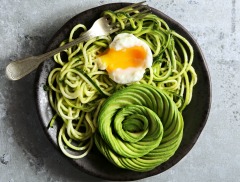Don't just meal plan... meal plan intelligently - with Meal Genius! Sign up for our free newsletter to get delicious recipes, sample meal plans and a whole lot more!
Pheasant
Pheasant is a medium-sized game bird. Like many birds, the male has a more colorful plumage than the female and is larger, weighing 2 1/2 to 5 pounds compared to the female's 3-pound average.
In general, the female's flesh is plumper, juicier and more tender. Farm-raised pheasants do not have the same flavor as the wild birds.
Pheasant is an excellent source of protein, selenium, vitamin B6, vitamin B12 and niacin.
The Benefits
- Special diets: Autoimmune Paleo Diet, Candida Diet, Diabetic, Elimination Diet, Gluten-Free Diet, Gluten-Free/Dairy-Free Diet, Grain-Free Diet, High Protein Diet, Low Acid Diet, Low Carb Diet, Low FODMAP Diet, Low Histamine Diet, Low Oxalate Diet, Low Starch Diet, Paleo Diet (Light), Paleo Diet (Strict), PCOS Diet, Primal Diet, Thyroid Diet, Whole Food
- Excellent Source of: Protein, Selenium, VitaminB6, VitaminB12, Niacin, Phosphorous
- Good Source of: Potassium, VitaminC, Riboflavin
- Preferences: No Fish, No Red Meat, No Pork, No Eggs, No Shellfish, No Gluten, No Nuts, No Seeds, No Soy, No Dairy, No Molds, No Pseudograins, No Coconut, No Citrus, No Nightshade, No Legumes, No Grains, No Corn, No Yeast, No Peanuts, Low Carbohydrate, Low Sodium, Low Sugars
Related Foods
Selecting and Storing
Choose wild pheasants when possible. Keep frozen or use fresh within 3 days.









